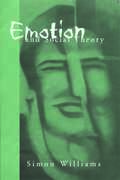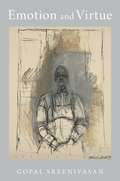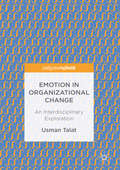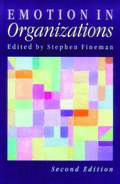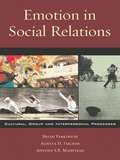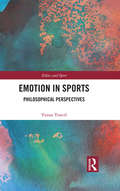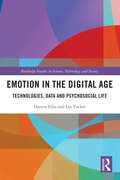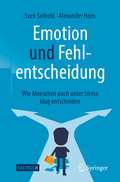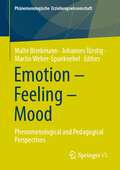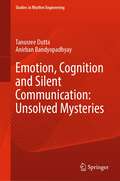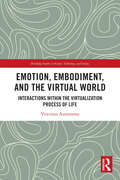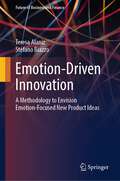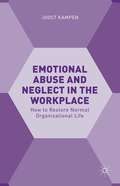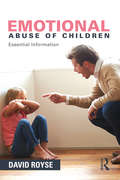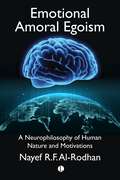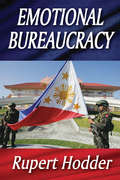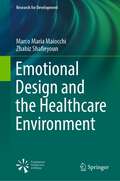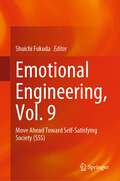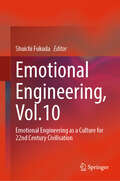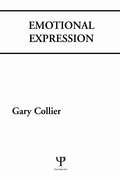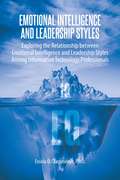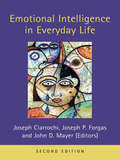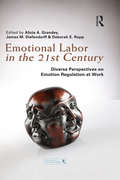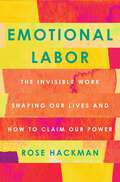- Table View
- List View
Emotion and Social Theory (Ir) Rational: Corporeal Reflections on the (Ir) Rational
by Prof Simon Johnson WilliamsThe emotions have traditionally been marginalized in mainstream social theory. This book demonstrates the problems that this has caused and charts the resurgence of emotions in social theory today. Drawing on a wide variety of sources, both classical and contemporary, Simon Williams treats the emotions as a universal feature of human life and our embodied relationship to the world. He reflects and comments upon the turn towards the body and intimacy in social theory, and explains what is important in current thinking about emotions. In his doing so, readers are provided with a critical assessment of various positions within the field, including the strengths and weaknesses of poststructuralism and postmodernism for examining the emotions in social life.
Emotion and Virtue
by Gopal SreenivasanA novel approach to the crucial role emotion plays in virtuous actionWhat must a person be like to possess a virtue in full measure? What sort of psychological constitution does one need to be an exemplar of compassion, say, or of courage? Focusing on these two examples, Emotion and Virtue ingeniously argues that certain emotion traits play an indispensable role in virtue. With exemplars of compassion, for instance, this role is played by a modified sympathy trait, which is central to enabling these exemplars to be reliably correct judges of the compassionate thing to do in various practical situations. Indeed, according to Gopal Sreenivasan, the virtue of compassion is, in a sense, a modified sympathy trait, just as courage is a modified fear trait.While he upholds the traditional definition of virtue as a species of character trait, Sreenivasan discards other traditional precepts. For example, he rejects the unity of the virtues and raises new questions about when virtue should be taught. Unlike orthodox virtue ethics, moreover, his account does not aspire to rival consequentialism and deontology. Instead Sreenivasan repudiates the ambitions of virtue imperialism.Emotion and Virtue makes significant contributions to moral psychology and the theory of virtue alike.
Emotion in Organizational Change
by Usman TalatThis book constructs a multi-disciplinary interpretation of emotion, specifically applied and discussed within Organizational Change environments. Including a range of perspectives from Philosophy, Evolutionary Sciences, Psychology and Sociology, Emotion in Organizational Change also provides a historical picture of our knowledge of emotion. The author explores how this understanding can contribute towards a novel understanding of a pervasive phenomenon in society and its organizations.
Emotion in Organizations (Second Edition)
by Stephen FinemanThis Second Edition contains key themes with all new contributors and is a completely separate work from the first. Emotion in Organization presents original work from leading scholars in the field, they engage with emotion as a qualitative phenomenon which shapes and is shaped by organizational life. Examining how emotion cannot be simply separated from thinking, judgment, decision-making and other so-called rational organizational processes, the book challenges us to build a passionate theory of organizations. <p><p> The introduction reviews the expansion of organizational emotion studies and their appeal to several social-scientific disciplines. Divided into four parts, the book reveals through stories, interviews, confessions, ethnographies and observations the way feeling and emotion lie at the heart of organizational functioning.
Emotion in Social Relations: Cultural, Group, and Interpersonal Processes
by Agneta H. Fischer Brian Parkinson Antony S.R. MansteadWithin psychology, emotion is often treated as something private and personal. In contrast, this book tries to understand emotion from the 'outside,' by examining the everyday social settings in which it operates. Three levels of social influence are considered in decreasing order of inclusiveness, starting with the surrounding culture and subculture, moving on to the more delimited organization or group, and finally focusing on the interpersonal setting.
Emotion in Sports: Philosophical Perspectives (Ethics and Sport)
by Yunus TuncelEmotion is central to human character, infiltrating our physiological functions and our mental constitution. In sport, athletes feel emotion in specific ways, from joy to anger and despair. This is the first book to examine emotion in sport from a philosophical perspective, building on concepts developed by ancient Greek and modern philosophers. For instance, how is Aristotle’s concept of catharsis applied to the sports field? How about power as advanced by Nietzsche, or existentialism as discussed by Kierkegaard? Emotion in Sports explores the philosophical framework for the expression of emotion and relates it to our psychological understanding, from the perspective of both athlete and spectator. A fascinating and useful read for students, researchers, scholars, and practitioners in the fields of sport sciences, philosophy, and psychology.
Emotion in the Digital Age: Technologies, Data and Psychosocial Life (Routledge Studies in Science, Technology and Society)
by Darren Ellis Ian TuckerEmotion in the Digital Age examines how emotion is understood, researched and experienced in relation to practices of digitisation and datafication said to constitute a digital age. The overarching concern of the book is with how emotion operates in, through, and with digital technologies. The digital landscape is vast, and as such, the authors focus on four key areas of digital practice: artificial intelligence, social media, mental health, and surveillance. Interrogating each area shows how emotion is commodified, symbolised, shared and experienced, and as such operates in multiple dimensions. This includes tracing the emotional impact of early mass media (e.g. cinema) through to efforts to programme AI agents with skills in emotional communication (e.g. mental health chatbots). This timely study offers theoretical, empirical and practical insight regarding the ways that digitisation is changing knowledge and experience of emotion and affective life. Crucially, this involves both the multiple versions of digital technologies designed to engage with emotion (e.g. emotional-AI) through to the broader emotional impact of living in digitally saturated environments. The authors argue that this constitutes a psycho-social way of being in which digital technologies and emotion operate as key dimensions of the ways we simultaneously relate to ourselves as individual subjects and to others as part of collectives. As such, Emotion in the Digital Age will prove important reading for students and researchers in emotion studies, psychology, science and technology studies, sociology, and related fields.
Emotion und Fehlentscheidung: Wie Menschen auch unter Stress klug entscheiden
by Alexander Horn Sven SeiboldDieses Sachbuch zeigt Ihnen, welche Logik unseren Entscheidungen zugrunde liegt – und wie Fehlentscheidungen entstehen. Sie lesen zur Veranschaulichung spannende Beispiele aus Politik und Zeitgeschehen sowie aus dem Alltag. Die Ergebnisse und Schlüsse sind sowohl im Beruf wie im Privaten für Sie nutzbar. Allerdings: Es ist anstrengend, gute Entscheidungen zu treffen. Man muss dem inneren Schweinehund entgegentreten und sich zum Denken zwingen, selbst wenn man das nicht möchte und sich das vielleicht auch nicht zutraut. Kommen Sie mit auf eine Entdeckungsreise. Aus dem Inhalt: Situationen – was Entscheiden schwer macht * Emotionen – schlechter als ihr Ruf * Denken – ist anstrengend, hilft aber * Fakten, Wahrnehmungen und Hypothesen * Rekonstruktion – man muss eine Situation verstehen * Gut entscheiden – der rote Faden * Wenn es darauf ankommt – machen Sie es wie Petrow * Nachwort – Persönlichkeit, Führung und die Anderen. Über die Autoren: Sven Seibold ist Psychologe und Professor für Wirtschaftspsychologie; berät Unternehmen in Verdachtsfällen von Mobbing, Burn-out, Wirtschaftskriminalität und Wirtschaftsspionage. Alexander Horn ist Kriminalrat beim Polizeipräsidium München, Leiter der Operativen Fallanalyse Bayern, Experte für schwierige polizeiliche Ermittlungen. Beide haben intensiv zu Entscheidungsverhalten in Extremsituationen geforscht und fanden die Ergebnisse so alltagsrelevant, dass sie diese hier praxisnah darstellen.
Emotion – Feeling – Mood: Phenomenological and Pedagogical Perspectives (Phänomenologische Erziehungswissenschaft #12)
by Malte Brinkmann Johannes Türstig Martin Weber-SpanknebelThis volume provides systematic, interdisciplinary, and intercultural impulses for a phenomenological pedagogy of emotions, feelings, and moods without subordinating them to the logocentric dualism of emotion and rationality. Starting from foundational and cultural perspectives on pedagogical relations of education, learning, and Bildung, specific emotions in individual studies, as well as different approaches of important representatives of phenomenological research on emotions are presented. The contributions include pedagogical, philosophical, and empirical approaches to feelings, emotions, and moods, highlighting their fundamental importance and productivity for learning, Bildung, and education in different pedagogical institutions and fields.
Emotion, Cognition and Silent Communication: Unsolved Mysteries (Studies in Rhythm Engineering)
by Anirban Bandyopadhyay Tanusree DuttaThis book provides an answer to the readers about scientific perspective on learning. It presents a culminating point of four different kinds of studies designed to measure and understand the nuances of brain functioning. The objective of this book is to find answers to four questions: (1) can there be a neuroscientific understanding of the concept of individual differences? (2) does rhythmic sound or noise have an impact on decision making? (3) how does transfer of learning between the hemispheres facilitate the learning process? and lastly (4) beyond the accepted ways of communicating verbally and non-verbally is silent communication possible? This book makes an attempt to address these issues through various aspects of inner-conscious engineering.
Emotion, Embodiment and the Virtual World: Interactions within the Virtualization Process of Life (Routledge Studies in Science, Technology and Society)
by Vincenzo AuriemmaThis book seeks to understand emotions in the virtual world. It explores embodiment, hybridization, and emotions within interactions mediated by a virtual avatar.The work aims to contribute to reflection within the sociology of emotion, creating a line of continuity that starts from the classical concept of empathy, passing through its virtualization and arriving at the transformation of everyday life online. Therefore, this work lends itself as a starting proposition, analysing different themes, from online emotions to sex, from the virtualization of bodies to their veneration, and from the internet of things to the internet of life.Examining emotions such as empathy, love, anger, and fear in the virtual world, it uses the metaverse as a case study for human cognitive and emotional embodiment mediated by avatars. This book will appeal to scholars and students interested in the sociology of emotion, the sociology of innovation, interaction, science and technology studies, media studies, and game studies.
Emotion-Driven Innovation: A Methodology to Envision Emotion-Focused New Product Ideas (Future of Business and Finance)
by Stefano Biazzo Teresa AlanizIt is now widely recognized that the emotional dimension of products and services is a critical success factor in many sectors. Generating products with significant emotional features is a complex challenge, as professionals responsible for designing and developing new products should be able to focus the design effort on eliciting specific emotions. But how do designers prepare themselves to convey emotions through the products they design? How do they know how to provoke certain emotions? To obtain the benefits that the knowledge of emotions can bring when it is integrated into the design process, professionals need to be assisted with approaches to apply the knowledge of emotions systematically and strategically. This book presents the development of a process to support product design teams to envision emotion-focused new product ideas - Emotion-Driven Innovation (E-DI). The E-DI process supports designers in identifying the occurrence of emotions in a certain category of products present in the market and applying this information to make strategic decisions when defining the emotional intentions for the new product. It also helps to focus their creative thinking to develop strong and meaningful emotion-centric new product ideas. This book targets a professional audience wanting to learn more about this process and provides useful tools and frameworks that can be applied in real-life cases.
Emotional Abuse and Neglect in the Workplace: How To Restore A Normal Organizational Life
by Joost KampenEmotional Abuse and Neglect in the Workplace tackles the big questions: How does emotional neglect of employees affect an organization? How can management effectively manage while restoring an organization’s health? When trust is gone, only reliable behavior by senior managers can help - and this takes time. The author explores striking similarities between the symptoms of ailing organizations and abusive or neglectful families. This book explores not only a new theory of neglected organizations, but also a set of methods enabling OD practitioners to restore employees’ trust. It also provides diagnostic tools and guidelines for change agents who confront organizational neglect head-on and includes case studies and real-life experiences of OD practitioners.
Emotional Abuse of Children: Essential Information
by David RoyseChildren and Emotional Abuse is a research-informed learning resource for students in social work about the dynamics and consequences of psychological abuse—especially as it occurs in dysfunctional families and affects children and adolescents. Emotional abuse is still not widely understood or recognized. Helping professionals need to recognize emotional abuse, understand the damage it does, the theories that account for it, and be prepared to help children and families where the abuse often occurs along with physical and sexual abuse. This text will draw upon current peer-reviewed literature and evidence-based studies and summarize essential information to prepare students for careers in helping professions. Each chapter will also contain brief vignettes to illustrate some of the key points. This book is for courses in child welfare and child abuse/neglect, as well as other social work courses that focus on children.
Emotional Amoral Egoism: A Neurophilosophy of Human Nature and Motivations
by Nayef Al-RodhanWhat makes us who we are? Are we born good or evil? Do we have free will? What drives our behaviour and why? Can technology change what it means to be human? In this thoroughly revised second edition of Emotional Amoral Egoism, Professor Nayef Al-Rodhan demonstrates the impact of our innate predispositions on key issues, from conflict, inequality and transcultural understanding to Big Data, fake news and the social contract. However, it is the societies we live in and their governance structures that largely determine how we act on our innate predispositions. Consequently, Al-Rodhan proposes a new and sustainable good governance paradigm, which must reconcile the ever-present tension between the three attributes of human nature ('Emotional Amoral Egoism') and the nine critical needs of human dignity. This book is a perfect resource for enlightened readers, academics and policy makers interested in how our innate instincts and tendencies shape the world we live in, and how the interplay between neurophilosophy and policy can be harnessed for pragmatic and sustainable peace, security and prosperity solutions for all, at all times and under all circumstances.
Emotional Bureaucracy
by Rupert HodderThis study casts doubt on the classic model of bureaucracy and its relevance to developing areas. In particular, Hodder challenges the Weberian distinction between the role of emotion and a modern bureaucracy's impersonal and rational qualities. He suggests that bureaucracies function differently, and offers a different perspective. The focus is the Philippines, but Hodder's conclusions are applicable to other developing areas.Two main themes are discussed. The first explores the classic Weberian model of bureaucracy. The second concerns ways of thinking about the social features of bureaucracy. The focus is dimensions of bureaucracy that are less dependent upon structure. What emerges is an innovative description of the social world of bureaucracy and its attributes.Hodder observes that discussions with civil servants and politicians in developing countries suggest that deepening emotion, a strengthening sense of the importance of social relationships, and informality are vital to the emergence of professional and stable organizations. Hodder believes it is possible to account for these social features of bureaucracy by understanding participants' representations and practices.While these ideas are discussed in the context of the Philippines, they have wider relevance to other states, especially those whose bureaucracies are characterized as weak and personalistic. The author suggests that these characterizations, and possible remedies, may need to be reconsidered. He argues that through informality and emotion, effective and stable organizations can be built: excessive formalism may exacerbate the problems that governments of developing countries are trying to solve. The means to strengthen bureaucracies in developing countries are already available and, rather than be ignored or suppressed, need be identified and encouraged.
Emotional Design and the Healthcare Environment (Research for Development)
by Marco Maria Maiocchi Zhabiz ShafieyounFor all of the tremendous advances in medicine and treatment the world has seen in the modern era, the human body’s ability to heal itself remains a (literally) vital and often overlooked facet of healthcare. Through the use of emotional design, aimed at transforming healthcare environments, such as waiting rooms, in such a way as to boost the emotional wellbeing of patients, and thus their general attitudes, including in regard to their own healing processes, medical institutions can improve outcomes for the people they treat while simultaneously lowering overall costs. Design, as an inherently transdisciplinary, problem-solving activity, is well-suited to this task. And when combined with a field of study such as neuroscience, which can literally map out the perceptions that lead to the experience of particular emotions, healthcare environments can be transformed into spaces (through such innovations as Kansei engineering) that then subsequently transform the people who rely on them the most, leading to more efficiency and less red ink.
Emotional Durability: Produkt- und Markenbindung in der Küchen- und Konsumgüterindustrie (BestMasters)
by Mia EllerstorferDie zunehmende ökologische Verantwortung und der Wunsch nach nachhaltigem Konsum fordern ein Umdenken im Design von Konsumgütern. Produkte, zu denen Menschen eine emotionale Bindung aufbauen, werden seltener ersetzt und länger genutzt – ein Ansatz mit großem Potenzial. In diesem Buch wird die Bedeutung von emotionaler Produkt- und Markenbindung im Kontext der Küchen- und Konsumgüterindustrie beleuchtet. Mia Ellerstorfer untersucht, welchen Einfluss Design und Produktentwicklung auf die Langlebigkeit von Konsumgütern haben. Dabei zeigt sie auf, wie die Wegwerfkultur durch Strategien zur Stärkung der Mensch-Produkt-Beziehung überwunden und eine nachhaltige Nutzung gefördert werden kann. Auf dieser Grundlage entwickelt die Autorin ein ganzheitliches Produktkonzept, das Konsument*innen die Möglichkeit zur individuellen Veredelung und Personalisierung von Küchenhelfern bietet. Das „Fina Refining Kit&“ vereint serielle Fertigung mit handwerklicher Beteiligung und eröffnet so neue Wege der Partizipation und Erhaltung durch Produktpflege. Durch die Einbindung der Nutzer*innen in die Fertigstellung des Produkts werden Produktionsschritte reduziert und die Wertschätzung für das Endprodukt gesteigert. Ein zugehöriger Businessplan analysiert das Marktpotenzial und bewertet die Umsetzbarkeit des Konzepts.
Emotional Engineering, Vol. 9: Move Ahead Toward Self-Satisfying Society (SSS)
by Shuichi FukudaThis is the latest volume in the series of Springer titles on emotional engineering tracking the development of this field.Engineering has been based on the Euclidean space approach and it was numerical data-centric. In short, our engineering up to now has been control-based, i.e., on tactics and problem solving. When we realize AI consumes 10,000 times more energy than human brain, we understand how it is better to use 10,000 people’s minds. But current society is industrial society. The industrial revolution introduced division of labour and we started to work for others. But the tremendous consumption of energy indicates that we need to move toward another society. If we can make the next society a self-Satisfying society (SSS) and create a new sustainable society with greater mental wellbeing then many emerging problems will be solved and we can enjoy our lives better. Emotional engineering engages with this challenge.
Emotional Engineering, Vol.10: Emotional Engineering as a Culture for 22nd Century Civilisation
by Shuichi FukudaThis book is the latest volume in the series of Springer titles on emotional engineering, tracking the development of this field. In our society, "Culture" emerges at the dawn of each era, laying the foundation for the development of "Civilization," which is then passed on to the succeeding era. "Culture" embodies the timeless essence of human characteristics, transcending temporal and spatial boundaries, encompassing the visionary pursuit of the future and the relentless quest for self-realization. Both "Motivation" and "Emotion" stem from the Latin word Movere, denoting movement. Why do we, as living beings, bear the epithet "Creatures"? It is because we instigate movement to thrive. Unlike other animals, who move merely to subsist in the present, humans navigate life with an eye toward tomorrow. "Emotion” etymologically signifies "to move out" in Latin, implying the act of manifesting one's inner realm in the external world. However, as denoted by the term "VUCA" (Volatility, Uncertainty, Complexity, and Ambiguity, our society is rapidly evolving into a realm of increasing complexity and diversity, transitioning from the tangible to the intangible. While the tangible realm necessitates interaction, the evolving landscape calls for the intervention of technology. Technology delves into the realm of "How." Yet, "Culture" resides in the emotional domain, pondering "What" and "Why,", as does Engineering. The "Process" of daring to transform dreams into reality assumes paramount significance. History admonishes us that now is the opportune moment to forge a novel "Civilization" for the twenty-second century. Let us harness the power of Emotional Engineering to sculpt the twenty-second century "Civilization" into its best iteration. This book of collected chapters sums up this challenge and how we can meet it.
Emotional Expression
by G. Collier Gary James CollierFirst published in 1985. Routledge is an imprint of Taylor & Francis, an informa company.
Emotional Intelligence and Leadership Styles: Exploring the Relationship between Emotional Intelligence and Leadership Styles Among Information Technology Professionals
by Eniola Olukayode OlagundoyeAll around the world, information technology is evolving at an alarming rate, and it could be challenging keeping up with the growing changes that we are witnessing with it. This paper explored the relationship between emotional intelligence and leadershi
Emotional Intelligence in Everyday Life
by John D. Mayer Joseph Ciarrochi Joseph P. ForgasSince the release of the very successful first edition in 2001, the field of emotional intelligence has grown in sophistication and importance. Many new and talented researchers have come into the field and techniques in EI measurement have dramatically increased so that we now know much more about the distinctiveness and utility of the different EI measures. There has also been a dramatic upswing in research that looks at how to teach EI in schools, organizations, and families.In this second edition, leaders in the field present the most up-to-date research on the assessment and use of the emotional intelligence construct. Importantly, this edition expands on the previous by providing greater coverage of emotional intelligence interventions.As with the first edition, this second edition is both scientifically rigorous, yet highly readable and accessible to a non-specialist audience. It will therefore be of value to researchers and practitioners in many disciplines beyond social psychology, including areas of basic research, cognition and emotion, organizational selection, organizational training, education, clinical psychology, and development psychology.
Emotional Labor in the 21st Century: Diverse Perspectives on Emotion Regulation at Work (Organization and Management Series)
by Deborah E. Rupp Alicia A. Grandey James M. DiefendorfThis book reviews, integrates, and synthesizes research on emotional labor and emotion regulation conducted over the past 30 years. The concept of emotional labor was first proposed by Dr. Arlie Russell Hochschild (1983), who defined it as "the management of feeling to create a publicly observable facial and bodily display" (p. 7) for a wage. A basic assumption of emotional labor theory is that many jobs (e.g., customer service, healthcare, team-based work, management) have interpersonal, and thus emotional, requirements and that well-being and effectiveness in these jobs is determined, in part, by a person’s ability to meet these requirements. Since Hochschild’s initial work, psychologists, sociologists, and management scholars have developed distinct theoretical approaches aimed at expanding and elaborating upon Hochschild’s core ideas. Broadly speaking, emotional labor is the study of how emotion regulation of oneself and others influences social dynamics at work, which has implications for performance and well being in a wide range of occupations and organizational contexts. This book offers researchers and practitioners a review of emotional labor theory and research that integrates the various perspectives into a coherent framework, and proposes an agenda for future research on this increasingly relevant and important topic. The book is divided into 5 main sections, with the first section introducing and defining emotional labor as well as creating a framework for the rest of the book to follow. The second section consists of chapters describing emotional labor theory at different levels of analysis, including the event, person, dyad, and group. The third section illustrates the diversity of emotional labor in distinct occupational contexts: customer service (e.g. restaurant, retail), call centers, and caring work. The fourth section considers broader contextual influences – organizational-, societal-, and cultural-level factors – that modify how and when emotional labor is done. The final section presents a series of ‘reflective essays’ from eminent scholars in the area of emotion and emotion regulation, where they reflect upon the past, present and future of emotion regulation at work.
Emotional Labor: The Invisible Work Shaping Our Lives and How to Claim Our Power
by Rose HackmanFor readers of Fair Play by Eve Rodsky and Burnout by Emily Nagoski and Amelia Nagoski comes a scathing, deeply-researched foray into the invisible, uncompensated work women perform every day. We’re tired.A stranger insists you “smile more,” even as you navigate a high-stress environment or grating commute. A mother is expected to oversee every last detail of domestic life. A nurse works on the front line, worried about her own health, but has to put on a brave face for her patients. A young professional is denied promotion for being deemed abrasive instead of placating her boss. Nearly every day, we find ourselves forced to edit our emotions to accommodate and elevate the emotions of others. Too many of us are asked to perform this exhausting, draining work at no extra cost, especially if we’re women or people of color.Emotional labor is essential to our society and economy, but it’s so often invisible. In this groundbreaking, journalistic deep dive, Rose Hackman shares the stories of hundreds of women, tracing the history of this kind of work and exposing common manifestations of the phenomenon. But Hackman doesn’t simply diagnose a problem—she empowers us to combat this insidious force and forge pathways for radical evolution, justice, and change.Drawing on years of research and hundreds of interviews, you’ll learn:· How emotional labor pervades our workplaces, from the bustling food service industry to the halls of corporate America· How race, gender, and class unequally shape the load we carry· Strategies for leveling the imbalances that contaminate our relationships, social circles, and households · Empowering tools to stop anyone from gaslighting you into thinking the work you are doing is not real workEmotional labor is real, but it no longer has to be our burden alone. By recognizing its value and insisting on its shared responsibility, we can set ourselves free and forge a path to a world where empathy, love, and caregiving claim their rightful power.
